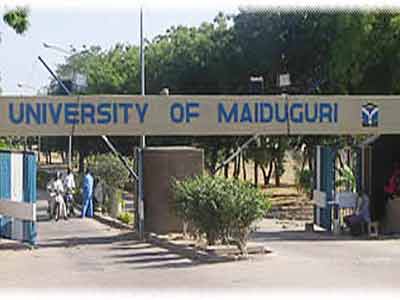 THE Vice Chancellor of University of Maiduguri (UNIMAID), Prof. Ibrahim Njodi, has said that sheer determination not to interrupt the school’s curriculum was among the key reasons why he refused to shut down the university while Boko Haram insurgents were on rampage in Borno State, the capital city and its environs.
THE Vice Chancellor of University of Maiduguri (UNIMAID), Prof. Ibrahim Njodi, has said that sheer determination not to interrupt the school’s curriculum was among the key reasons why he refused to shut down the university while Boko Haram insurgents were on rampage in Borno State, the capital city and its environs.
Njodi, who disclosed this in Abuja at the launching of a book titled “Elementary Marketing For Senior Secondary Schools” co-authored by Chima Azu and Razaq Abdullahi, said that he resisted the pressure by both parents and stakeholders to shut down the school for fear of attacks because he believed that such a move would have been defeatist in nature.
According to him, he put his trust in God that none of the students of UNIMAID would be victim of attack by Boko Haram, and simply intensified vigilance with the use of the school’s local security watch and with the assistance of the Joint Military Task Force posted to the state.
University of Maiduguri never closed for a day in the heat of attacks by insurgents. This was just a mark of our resolve not to be deterred by the attacks. Parents told me to close the university. What I kept asking them was that if I close the university on security grounds, when would the security condition ever be conducive to reopen it.
Besides, there is only one exit into and out of Maiduguri, and that is Damaturu. And the whole of Damaturu was under siege by the group. So, if I close the school, what I am simply doing is to allow my students to fall prey to them. So, I decided to damn the consequences.
And by God’s grace, we were able to weather the storm. However, I want to also commend the JTF who when they saw my resilience, decided to stake their lives to provide us security. What I did was to go round the school on regular basis, visiting students at nights, and sometimes while they were asleep, I will conduct a check round the hostels. Even in the lecture halls, I visited them regularly to encourage them. Today, we thank God for His mercy,” he said.
The VC added that at the moment, normalcy was beginning to return to Borno and a new academic session slated to begin before the year ends. According to him, the university had devised a strategy to mitigate the security fears of some parents, adding that for that reason, the university will not conduct post-UTME for the over 12,000 students who applied to the university for admission this year.
Meanwhile, one of the authors of the book, Chima Azu, stated that he and Razaaq Abdullahi decided to write the book to fill the gap created by absence of full-scale marketing subject in secondary education curriculum in the country. He stressed that beyond giving students adequate knowledge on entrepreneurship, it would also arm them with basic skills needed to market their skills anywhere in the world.
Azu added that with the publication of the book, the road is now clear for students to start sitting for marketing exams in subsequent exams, as the secondary Education Board of UBEC and the FCT are fully involved in the publication.
On his own, Deputy Director, FCT Education Board, Abdullahi Umar Sanda, stated that the publication of the book on marketing in secondary schools was a welcome development, especially in view of the need to train students who can be self-employed at any stage in life, urging other teachers to emulate the two authors by researching in their fields of study adequately in order to come up with modern teaching aids that can be of benefits to students.



